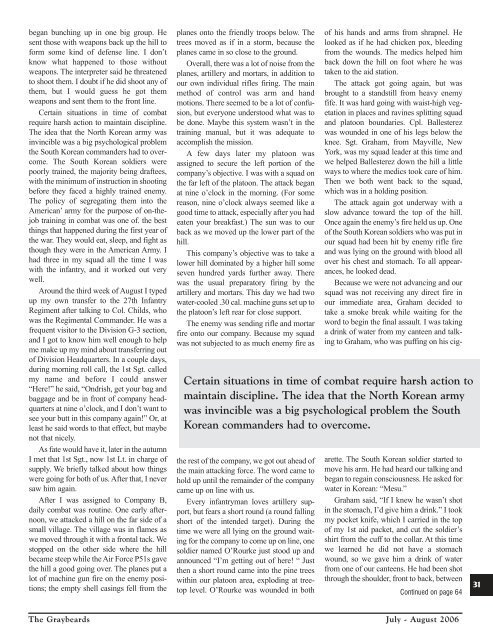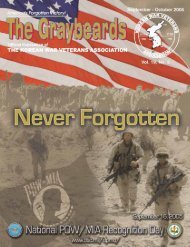Jul/Aug 2006 - Korean War Veterans Association
Jul/Aug 2006 - Korean War Veterans Association
Jul/Aug 2006 - Korean War Veterans Association
You also want an ePaper? Increase the reach of your titles
YUMPU automatically turns print PDFs into web optimized ePapers that Google loves.
egan bunching up in one big group. He<br />
sent those with weapons back up the hill to<br />
form some kind of defense line. I don’t<br />
know what happened to those without<br />
weapons. The interpreter said he threatened<br />
to shoot them. I doubt if he did shoot any of<br />
them, but I would guess he got them<br />
weapons and sent them to the front line.<br />
Certain situations in time of combat<br />
require harsh action to maintain discipline.<br />
The idea that the North <strong>Korean</strong> army was<br />
invincible was a big psychological problem<br />
the South <strong>Korean</strong> commanders had to overcome.<br />
The South <strong>Korean</strong> soldiers were<br />
poorly trained, the majority being draftees,<br />
with the minimum of instruction in shooting<br />
before they faced a highly trained enemy.<br />
The policy of segregating them into the<br />
American’ army for the purpose of on-thejob<br />
training in combat was one of. the best<br />
things that happened during the first year of<br />
the war. They would eat, sleep, and fight as<br />
though they were in the American Army. I<br />
had three in my squad all the time I was<br />
with the infantry, and it worked out very<br />
well.<br />
Around the third week of <strong>Aug</strong>ust I typed<br />
up my own transfer to the 27th Infantry<br />
Regiment after talking to Col. Childs, who<br />
was the Regimental Commander. He was a<br />
frequent visitor to the Division G-3 section,<br />
and I got to know him well enough to help<br />
me make up my mind about transferring out<br />
of Division Headquarters. In a couple days,<br />
during morning roll call, the 1st Sgt. called<br />
my name and before I could answer<br />
“Here!” he said, “Ondrish, get your bag and<br />
baggage and be in front of company headquarters<br />
at nine o’clock, and I don’t want to<br />
see your butt in this company again!” Or, at<br />
least he said words to that effect, but maybe<br />
not that nicely.<br />
As fate would have it, later in the autumn<br />
I met that 1st Sgt., now 1st Lt. in charge of<br />
supply. We briefly talked about how things<br />
were going for both of us. After that, I never<br />
saw him again.<br />
After I was assigned to Company B,<br />
daily combat was routine. One early afternoon,<br />
we attacked a hill on the far side of a<br />
small village. The village was in flames as<br />
we moved through it with a frontal tack. We<br />
stopped on the other side where the hill<br />
became steep while the Air Force P51s gave<br />
the hill a good going over. The planes put a<br />
lot of machine gun fire on the enemy positions;<br />
the empty shell casings fell from the<br />
planes onto the friendly troops below. The<br />
trees moved as if in a storm, because the<br />
planes came in so close to the ground.<br />
Overall, there was a lot of noise from the<br />
planes, artillery and mortars, in addition to<br />
our own individual rifles firing. The main<br />
method of control was arm and hand<br />
motions. There seemed to be a lot of confusion,<br />
but everyone understood what was to<br />
be done. Maybe this system wasn’t in the<br />
training manual, but it was adequate to<br />
accomplish the mission.<br />
A few days later my platoon was<br />
assigned to secure the left portion of the<br />
company’s objective. I was with a squad on<br />
the far left of the platoon. The attack began<br />
at nine o’clock in the morning. (For some<br />
reason, nine o’clock always seemed like a<br />
good time to attack, especially after you had<br />
eaten your breakfast.) The sun was to our<br />
back as we moved up the lower part of the<br />
hill.<br />
This company’s objective was to take a<br />
lower hill dominated by a higher hill some<br />
seven hundred yards further away. There<br />
was the usual preparatory firing by the<br />
artillery and mortars. This day we had two<br />
water-cooled .30 cal. machine guns set up to<br />
the platoon’s left rear for close support.<br />
The enemy was sending rifle and mortar<br />
fire onto our company. Because my squad<br />
was not subjected to as much enemy fire as<br />
the rest of the company, we got out ahead of<br />
the main attacking force. The word came to<br />
hold up until the remainder of the company<br />
came up on line with us.<br />
Every infantryman loves artillery support,<br />
but fears a short round (a round falling<br />
short of the intended target). During the<br />
time we were all lying on the ground waiting<br />
for the company to come up on line, one<br />
soldier named O’Rourke just stood up and<br />
announced “I’m getting out of here! “ Just<br />
then a short round came into the pine trees<br />
within our platoon area, exploding at treetop<br />
level. O’Rourke was wounded in both<br />
Certain situations in time of combat require harsh action to<br />
maintain discipline. The idea that the North <strong>Korean</strong> army<br />
was invincible was a big psychological problem the South<br />
<strong>Korean</strong> commanders had to overcome.<br />
of his hands and arms from shrapnel. He<br />
looked as if he had chicken pox, bleeding<br />
from the wounds. The medics helped him<br />
back down the hill on foot where he was<br />
taken to the aid station.<br />
The attack got going again, but was<br />
brought to a standstill from heavy enemy<br />
fife. It was hard going with waist-high vegetation<br />
in places and ravines splitting squad<br />
and platoon boundaries. Cpl. Ballesterez<br />
was wounded in one of his legs below the<br />
knee. Sgt. Graham, from Mayville, New<br />
York, was my squad leader at this time and<br />
we helped Ballesterez down the hill a little<br />
ways to where the medics took care of him.<br />
Then we both went back to the squad,<br />
which was in a holding position.<br />
The attack again got underway with a<br />
slow advance toward the top of the hill.<br />
Once again the enemy’s fire held us up. One<br />
of the South <strong>Korean</strong> soldiers who was put in<br />
our squad had been hit by enemy rifle fire<br />
and was lying on the ground with blood all<br />
over his chest and stomach. To all appearances,<br />
he looked dead.<br />
Because we were not advancing and our<br />
squad was not receiving any direct fire in<br />
our immediate area, Graham decided to<br />
take a smoke break while waiting for the<br />
word to begin the final assault. I was taking<br />
a drink of water from my canteen and talking<br />
to Graham, who was puffing on his cigarette.<br />
The South <strong>Korean</strong> soldier started to<br />
move his arm. He had heard our talking and<br />
began to regain consciousness. He asked for<br />
water in <strong>Korean</strong>: “Mesu.”<br />
Graham said, “If I knew he wasn’t shot<br />
in the stomach, I’d give him a drink.” I took<br />
my pocket knife, which I carried in the top<br />
of my 1st aid packet, and cut the soldier’s<br />
shirt from the cuff to the collar. At this time<br />
we learned he did not have a stomach<br />
wound, so we gave him a drink of water<br />
from one of our canteens. He had been shot<br />
through the shoulder, front to back, between<br />
Continued on page 64<br />
31<br />
The Graybeards<br />
<strong>Jul</strong>y - <strong>Aug</strong>ust A<br />
<strong>2006</strong>

















